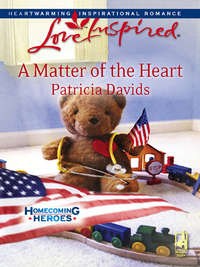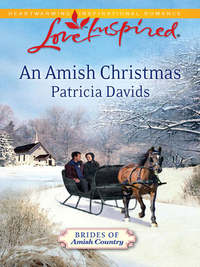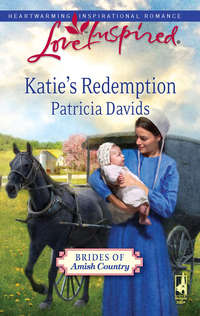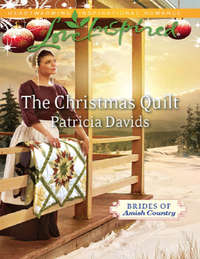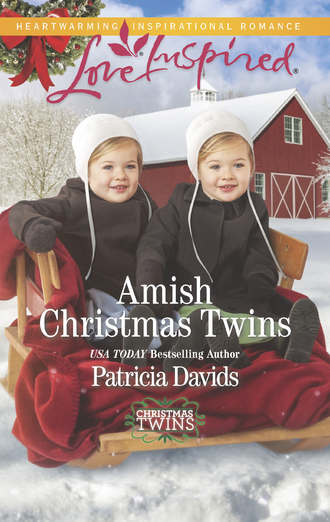
Полная версия
Amish Christmas Twins
Inside the house, little had changed since the day her parents walked away from their Amish life with her in tow. The wide plank floor of the kitchen had been scrubbed clean. A simple table with four chairs sat in the center of the room. The windows were free of shades or curtains, for an upright Amish family in her grandfather’s ultraconservative church had nothing to hide from the outside world. A single plate, cup and fork in the dish drainer by the sink proved her grandfather still lived alone. The room smelled faintly of bleach and stout coffee. The scent transported her to the past the way nothing else had done.
She had been fifteen the last time she stood in this room, completely confused by the family quarrel taking place. One day she was Amish and knew her place in the world. She knew what was expected of her. She had been a week away from her baptism. The next week she was an awkward, shy, frightened girl trying to fit into the perplexing English world her parents had chosen.
Her Amish childhood had been filled with hard work, but she had been happy here. If her grandfather took them in, she could be happy here again. Nothing mattered as long as she had her children with her.
She led her girls to the heavy wood-burning cookstove and held out her hands to the welcome heat. “Don’t touch. It’s very hot,” she cautioned them.
“Are your children hungry?” her grandfather asked, speaking Deitsh.
“I’m sure they are.”
“Have them sit.” He walked to the counter and opened a drawer.
Willa helped the girls out of their coats and seated them at the table. She hung their coats on pegs by the front door and then stood behind her daughters, not daring to assume the invitation included her.
He scowled when he turned around. “Sit. I will not eat with you, but I am permitted to feed the hungry as our Lord commanded us. Then you must go.”
Willa’s heart sank, but she held on to the hope that he would change his mind when he learned the details of her situation. She took a seat at the table and waited while her grandfather prepared church spread for her daughters.
A mixture of peanut butter, marshmallow cream and maple syrup, the tasty treat was often served on bread or used as a dip for apples or pears. He spread it on thick slices of homemade bread and set it on plates in front of them. It was just as good as Willa remembered...
The girls loved it. When they were finished eating, she led them to the stark living room and settled them for a nap on the sofa.
When she was sure they were sleeping, she returned to the kitchen. Her grandfather sat at the table with a cup of coffee in his hands.
She stood across from him and laid a protective hand on her stomach. “I have no money. I have no job. I don’t have a place to live, and my baby is due the second week of January.”
Willa thought she glimpsed a flash of sympathy in his eyes. “Your husband’s family will not help you?”
A chill slipped over her skin. She crossed her arms to ward it off. They were the ones claiming she was an unfit mother because of her mental breakdown. According to Glen, they had paid an unscrupulous judge to grant them custody of the twins while she was in the hospital. Willa knew nothing about the law, but without money and without Glen to help her, they would succeed in taking her children away. She couldn’t allow that. “Nee, you are my last hope.”
* * *
Her grandfather took a sip of his coffee. “I have no money to give you.”
“I don’t want money. I wish to return to the Amish faith.” She held her breath, hoping he believed her.
He was silent for a long time. She waited and prayed for his forgiveness and for his understanding.
He shook his head. “I can’t help you. You must go.”
She couldn’t bear to hear those words. Not after she had come so far. Tears sprang to her eyes, but she blinked them back. “Please, I’m begging you. I have nowhere else to go. Don’t turn us away. We are your flesh and blood.”
His brow darkened. “You come to me wearing Englisch clothes, with your shorn hair and your head uncovered. I see no repentance in you. I have heard none from your lips, yet you say you want to be Amish again. You share in the shame your father brought to this house.”
“I was a child. I had no choice but to go with my parents.”
“You chose to remain in the Englisch world all these years, even after the death of my son and his wife. You could have come back then. I would have taken you in. Nee, I will not help you now. This suffering, you have brought on yourself.” He rose, put on his hat and coat and went out the door.
Willa sat at the table and dropped her head on her crossed arms as she gave in to despair. Gut-wrenching sobs shook her body. Why was God doing this? Hadn’t she suffered enough? How much more would He ask of her?
Chapter Two
“I’m sorry I’m late. I had a few unexpected delays.” John stepped down from his wagon as Melvin Taylor came out of the house to meet him.
“You said you’d be here today. It’s still today.” Melvin pushed the brim of his red ball cap up with one finger and grinned.
Relief made John smile. Melvin appeared to be the understanding sort and a rare Englisch fellow in John’s book—one who wasn’t in a rush. His hopes for more work from the man rose.
“Can’t thank you enough for taking on my little project.”
“I enjoyed restoring it.” He loved re-creating useful things from the past.
Melvin rubbed his hands together. “Well, don’t keep me in suspense any longer. How did it turn out?”
“I’ll let you be the judge.” Moving to the back of the wagon, John untied the ropes and lifted the tarp covering his load. The antique blue-and-gold sleigh had made the journey unharmed.
“I knew she was a beauty under all that neglect.” Melvin drew his fingers along the smooth, elaborately curved metal runner. “I’m right pleased with your work, John Miller.”
“Danki.”
It had taken John weeks to duplicate all the missing pieces in his forge and assemble it. After he replaced the tattered upholstery with a plush blue tufted fabric, the result was well worth his time and effort. The Portland Cutter would glide through the snow as neatly now as it had a hundred and fifty years ago.
He had managed to turn back the hands of time for the sleigh. If only he could change one hour of the past for himself.
Such a thing wasn’t possible. He had to spend the rest of his life knowing his pride had cost the life of the only woman he would ever love. His penance was to go on living without her. Hard work at his forge was the only way he kept the long hours of loneliness at bay.
Melvin stepped back from the wagon with a big grin on his face. “Would you be willing to take on another project for me?”
John tried not to sound too eager. “I’d have to see it first and we would have to agree on a price.”
“Sure. I think you’ll like my latest find.”
John followed the childishly eager man to a large shed. Melvin pushed open the sliding door with a flourish to reveal a half dozen sleighs. Five were in pristine condition. Only one needed restoration work. A lot of work.
Melvin patted the faded front seat, sending a small cloud of dust into the air. “I found this vis-à-vis sleigh at a farm sale about an hour north of here.”
John walked around the vehicle, assessing what needed to be fixed. Vis-à-vis sleighs were easily recognizable. They consisted of a raised coachman’s seat and two lower passenger seats behind the driver that faced each other. They had originally been used in cities where well-to-do people were driven about during the winter to parties and such.
He checked the floorboards first. They were rotten. That was to be expected. Three of the ornate lantern holders were missing, but he could duplicate them from the one remaining. The runners looked sound. They must have been repaired at some time in the past. The upholstery definitely needed replacing, but the wooden frames of the seats looked in good shape. “I can have it ready in three weeks, maybe less.”
He could finish it in two weeks, but he didn’t want to lock himself into a shorter time frame. More pressing work might come up. Better to finish earlier than promised rather than later.
“Awesome. To have it finished before Christmas, that will be great. Let’s hope for plenty of snow.” They agreed on the price and the men shook hands.
“Shall I ship it to you?” Melvin asked as they walked toward the door.
“I figured the cost of transporting it home and bringing it back myself in my estimate. If I have to hire someone to ship it back, that will be an additional charge.”
“Agreed. I’ll help you get the other one unloaded and this one strapped on, and then we can have a cup of coffee. The missus put on a fresh pot when she saw you drive in.” The two men walked toward the house.
Unbidden, the thought of the young mother he’d met earlier entered John’s mind. He should have asked her name. Melvin might know. Although her business was none of his, John’s curiosity got the better of him. He glanced at Melvin. “I met someone on my way here who said she knew you.”
“Oh? Who might that be?”
John unstrapped one side of the sleigh and tossed the lines to Melvin. “She said Ezekiel Lapp is her grandfather. I gave her a lift to his place.”
Melvin’s bushy eyebrows shot up in surprise. “Willa Lapp has come home?”
“She didn’t give her name.”
“It has to be Willa. Ezekiel only had one son and one grandchild. I haven’t seen that sweet girl in years. How is she?”
So her name was Willa. “She looked fine. She had two daughters with her. Twins about three years old.” He and Melvin lifted the sleigh down and carried it to the shed.
Melvin put down his end and leaned on the upholstered back. “Little Willa is a mother, if that don’t beat all. I sure can’t imagine her grown and married with kids. I hope Ezekiel has the good sense to let bygones be bygones. He’s a lonely old man. His wife passed on years ago. Then his son left the Amish and took his wife and Willa with him. I heard Ezekiel’s church shunned them, so I reckon he had to, as well.”
That brought John up short. Was Willa an excommunicated member of the Amish church? If so, her relationship with her grandfather was much more complicated than a non-Amish person like Melvin realized. To willingly take the vow of baptism and then break that vow was a serious offense. John started to wish he hadn’t asked about her.
“It broke the old man’s heart. He wouldn’t even speak his son’s name. I thought the Amish forgave everyone. Don’t they forgive their own for leaving?”
“If a person leaves before they are baptized, they are not shunned. If a baptized member repents and confesses their sins, they will be forgiven and welcomed back into the church.” Perhaps that was why Willa had returned after so many years.
“And if they don’t repent, they have to be shunned forever?”
“That is our belief.”
Melvin shook his head. “The Amish folks around here are fine people and good neighbors, but I don’t expect I’ll ever really understand them.”
Embarrassed that he had pried into Willa’s personal life when she hadn’t shared anything, he decided to dismiss her from his mind and changed the subject. “How did you get into collecting sleighs?”
Melvin happily shared the story of his passion while the men loaded the vis-à-vis.
An hour later, John left Melvin’s farm with his thermos full of coffee and a dozen oatmeal cookies in a box under his seat. He would spend the night again with his cousins near Berlin and be home by late afternoon on Monday. As the mailbox for Ezekiel Lapp came into view, John slowed his team and looked toward the house.
His own sister hadn’t joined the faith, choosing instead to marry a non-Amish fellow. Many Amish families had Englisch children and grandchildren who were accepted and cherished. He prayed that Willa and her daughters would find kindness and acceptance, too.
He slapped the reins to get his team moving faster. It was a long way to Bowmans Crossing. He had no cause to worry about a stranger and her family. He would never see them again. They were in God’s hands.
* * *
Willa raised her head and saw it was almost dark outside. She must have fallen asleep. Her head hurt from crying. She rose stiffly and stretched her aching back, then wiped her damp cheeks as she looked around. Were the girls still sleeping? That would be unusual.
She checked in the living room. The sofa was empty. She called their names, but neither of them answered. Where were they? Panic uncoiled inside her. Their coats were gone from the pegs where she had hung them. She yanked open the front door and saw them come out of the barn walking beside her grandfather.
Lucy saw her first and came running. “Mama, I saw a cow.”
Willa’s pounding heart slowed with relief. She dropped to one knee and hugged Lucy. “Did you? Was she a nice cow?”
Lucy nodded. “She licked her nose like this.” Lucy stuck her tongue out and tried to touch it to her nose.
“Cows poo in the dirt,” Megan said with a look of disgust.
Willa held back a chuckle as she rose to her feet. She stepped aside as her grandfather carried a red pail of fresh milk up the steps. From under the porch, half a dozen kittens came out meowing for their supper. Her grandfather handed Megan the pail. “Pour this in the pan for the kittens.”
“I help.” Lucy grabbed the side of the pail. The two girls poured out the milk while the kittens tumbled around their feet and into the aluminum pie pan.
She left Megan and Lucy to play with the cats and followed her grandfather inside.
“Thank you for watching the girls and letting me sleep.”
“You were worn-out.”
“I was. It has been a long time since I’ve had a peaceful night’s rest.”
He was silent for a long moment, then he glanced toward the porch. The girls were still playing with the kittens. “Out in the barn Megan told me that bad people are looking for her and Lucy. What did she mean?”
Willa decided to tell him and took a seat at the table. After all, what did she have to lose? “My husband, Glen, had a falling-out with his parents before he met me. He would never talk about it except to say that they wanted to lock him up. He was a good man. I can’t believe he did anything wrong.”
Even as she defended him, she knew it wasn’t entirely true. Glen found it easy to assume new identities and fabricate stories about where they came from without remorse, but he had been good to her.
“Go on,” her grandfather said.
“He was always worried that they would find us. We moved three times the first year we were married. Then the girls were born.”
Shame burned in Willa’s throat, but she forced herself to continue. “Trying to take care of fussy twins wore us down. I’m not making excuses, but it was hard. We didn’t have any help. Glen had to work and I was home alone with the babies. I never got enough sleep. I became...sick.”
Her grandfather wouldn’t understand the terrible things she had done. How could he when she didn’t understand them herself. She should have been stronger. The doctors at the hospital had called it postpartum psychosis. The voices telling her to hide her babies from Glen hadn’t been real. They had been delusions, but she had done all they told her to do, even wading into the cold, rain-swollen river with the babies in her arms. They all would have died that night if not for the quick-thinking intervention of a stranger.
Willa realized she had been staring into the past, trying to remember all that had happened, but so much of her memory was blank. “I spent four weeks in a hospital. Glen couldn’t manage alone. He contacted his parents, believing they would help for the sake of their grandchildren. They came, but they only wanted to take the girls away from us. They said we were unfit parents and that the law was on their side.”
Tears slipped down Willa’s cheeks and she brushed them away. Tears wouldn’t help anything. She had to be strong. It was up to her now. “Glen managed to get away with the babies before the police came. He picked me up at the hospital and we left town with only the clothes on our backs. We tried to start over, but we had to move so many times I lost count. After Glen died, I didn’t know what to do except to come here. If his parents find me, they will take the girls away and I’ll never see them again.”
“Will the Englisch police come here?”
“Maybe, I can’t be sure. I was careful not to tell anyone where I was going. I purchased a ticket for the next town down the road, but I got off the bus before then. People on the bus may remember us. An Amish fellow gave us a lift here, but he wasn’t from this area. I do know Glen’s parents won’t stop looking for the girls, but it will be hard to find us among the Amish.”
He stared into his coffee cup for a long time. Finally, he glanced at her. “Up in the attic you will find a black trunk. There are clothes that you and the girls can wear in it. They will be warmer than what they have on now. They are goot Amish clothes. If you mean to rejoin the faith, you must dress plain.”
“Does this mean we can stay?” She was afraid to hope.
“With me, nee. Go to my sister, Ada Kaufman. She was also shunned by our church, but I hear she has kept to the Amish ways in a new church group in Hope Springs.”
Willa had fond memories of her great-aunt Ada, a kindly and spry woman with a son and daughter a few years older than Willa. A flicker of hope came alive inside her chest. She still had family she could go to.
The thought of spending Christmas with her aunt and cousins Miriam and Mark made Willa smile. They’d had some fine times together in the old days. Her cousins might be married with children of their own by now. Her daughters could have cousins to celebrate the holidays with the way she once did.
“Do you think Ada will help me?”
“That, I cannot say. I have an old buggy and a horse you can use to travel there.”
“How far is it?” Willa had never heard of Hope Springs.
“Three days’ travel to the east, more or less.”
Three days by buggy with the girls. It would be next to impossible. Where would they stay at night? What would they eat? She had no money. And yet, what choice did she have except to go on faith? There was no going back now. “Danki, Daddi. What made you change your mind?”
“Your children deserve the chance to know our ways. I pray Gott opens your heart and that you seek true repentance. When you do so, you will be welcomed here.”
“I’ll send you money for the horse and buggy when I can,” she promised.
“I want no money from you. They are a gift to your children. You may all sleep upstairs in your old room, but you must leave at first light on Monday.”
It wasn’t what she had hoped for, but she wasn’t beaten yet. Perhaps her great-aunt’s family would be like the kind Amish man she had met that afternoon. The memory of his solid presence and quiet kindness filled her heart with renewed hope. She wished she had been bold enough to ask his name. She would remember him in her prayers.
* * *
Three days after delivering his restored sleigh, John was home and hard at work on his new project. The coals in his forge glowed red-hot with each injection of air from his bellows. Sweat poured down his face. He tasted salt and ashes on his lips, but he didn’t move back. The fire was almost hot enough. Using long tongs, he held a flat piece of iron bar stock in the glowing coals, waiting until it reached the right temperature to be shaped by his hammer. A black heat would be too cold. A white heat would be too hot. A good working heat was the red-orange glow he was waiting on. The smell of smoke and hot metal filled the cold air around him.
Movement out on the road that fronted his property caught his attention. He let go of the tongs and shaded his eyes with one hand to see against the glare of the late-afternoon sun. Was his mother coming home from the quilting bee already? He didn’t expect her for another hour.
A buggy approached the top of the hill, but it wasn’t one he knew. He didn’t recognize the skinny horse between the shafts, either. He’d put shoes on nearly every horse in the area. He knew them and their owners on sight. This was someone new, and he or she was driving erratically.
The horse trotted up the road veering from side to side in a tired, rambling gait. Its black hide was flecked with white foam, but it kept going. The road led uphill to where his lane turned off at the crest. Just beyond that, the road sloped downward for a few hundred yards before it ended in a T where it intersected the blacktop highway that skirted the edge of the river just beyond. The tired horse crested the hill and stumbled but didn’t turn in John’s lane. As it went past, John realized there wasn’t anyone in the driver’s seat.
It was a runaway. Without someone to stop it, the horse was likely to trot straight across the highway into traffic and perhaps even into the river.
John let go of the bellows, sprinted up his lane and out into the road after the buggy. Had the horse been fresh, he wouldn’t stand a chance of catching it, but it was tiring. The steep climb had slowed it.
“Whoa there, whoa,” he shouted, praying the horse was well trained and would respond to the command. It kept going. Sprinting harder, he raced after the vehicle, his lungs burning like his forge. There was traffic below on the highway. A horse-drawn wagon loaded with hay slowed several cars, but one after the other, they pulled out and sped around him. The buggy was unlikely to make it across without being hit.
Running up behind the vehicle, John realized it was a Swartzentruber buggy. The most conservative group among the Amish, the Swartzentruber didn’t fit their buggies with the slow-moving-vehicle sign, windshields, mirrors or electric lighting. One rear wheel wobbled heavily. He finally drew close enough to grab the rear door handle. Yanking it open, he gave one final burst of effort and threw himself inside, no easy task for a man of his size.
The buggy wasn’t empty. There were two little girls in black bonnets holding on to each other in the back seat. They started screaming when they saw him.
“Shush, shush. Ich bin freind.” He spoke in Deitsh, telling them he was a friend. He quickly climbed over the seatback. An Amish woman lay slumped on the floorboards, her face obscured by the large black traveling bonnet she wore. The reins had fallen out of her hands but not out of the buggy. He glanced out the front and saw the horse was nearly at the bottom of the hill. The highway was less than ten yards away.
John grabbed the reins and pulled back as he stomped on the buggy brake. The foam-flecked black mare stumbled to a halt and hung her head, her sides heaving as a car zipped past. The poor horse didn’t even flinch.
John quickly checked the woman on the floor. She was dressed in a heavy black winter coat, gloves and a black traveling bonnet. He could see she was breathing. He tried rousing her without success by shaking her shoulder. He had no idea what was wrong. The girls in back kept crying for their mama.
After lifting the woman onto the seat, he spoke to the girls again in Deitsh. “What are your names? Do you live near here? What is your papa’s name?”
They were too frightened or too shy to answer him. As he pulled his arm from behind the woman’s head, he noticed a smear of blood on his sleeve. He untied her bonnet and removed it. Her kapp came off with it and her blond curls sprang free. His breath caught in his throat as he recognized the woman he’d given a lift to several days before.
What was Willa Lapp doing here?
The side of her head was matted with dried blood, but the wound under it was only a shallow gash. Had she struck her head hard enough to be knocked unconscious, or had she hurt herself when she fell? He had no way of knowing.
He asked the children what had happened, but they only stared at him fearfully without answering. He would have to wait until the woman could answer all his questions when she came to.


